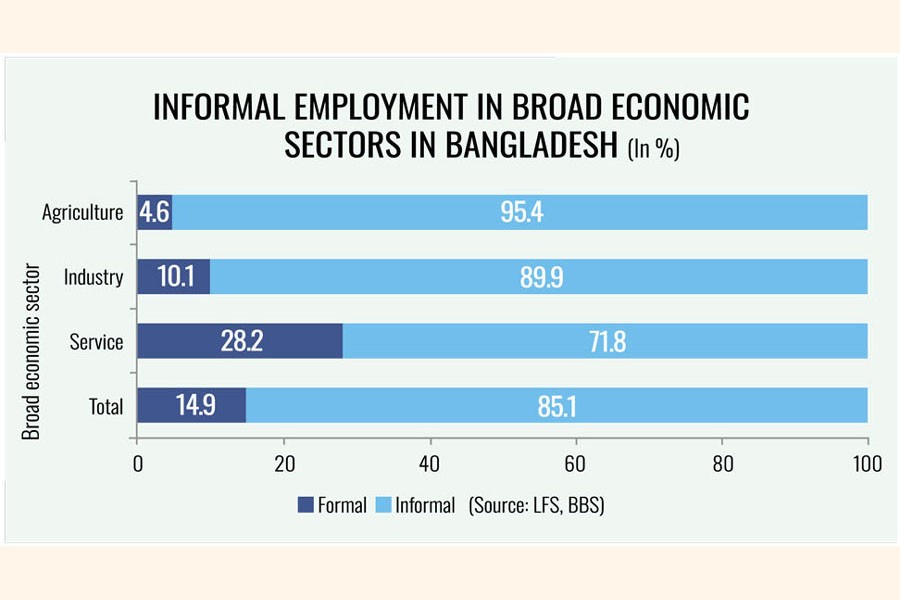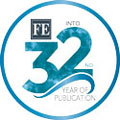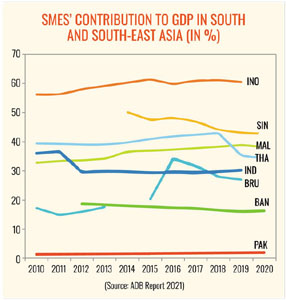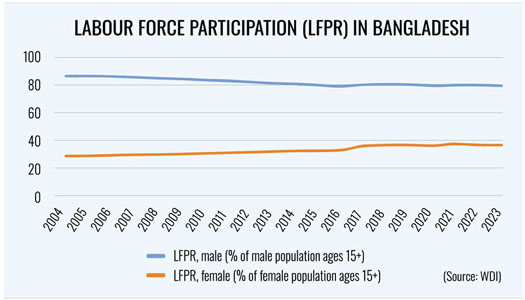Towards inclusive growth in Bangladesh
Fostering small enterprises, workforce equity, and social justice amid political transition

Published :
Updated :

As Bangladesh navigates a shifting political landscape, the call for economic inclusivity is stronger than ever. At the heart of these changes lies an urgent need to make sure that every citizen can benefit from the nation's economic progress. For a country with a rapidly expanding GDP and ambitious development goals, addressing structural inequities in the economy has become essential. This includes fostering small enterprises, enhancing women's workforce participation, and uplifting marginalised communities to ensure equitable growth. Bangladesh's future economic stability and resilience depend on policies that prioritise shared prosperity, economic inclusion, and sustainable development for all.

Small and Medium Enterprises: Strengthening the backbone of the economy
In the context of Bangladesh's economic and political transition, Small and Medium Enterprises (SMEs) have emerged as a vital force in driving economic growth and employment. SMEs account for approximately 90 per cent of industrial units and create 80 per cent of employment within the industrial sector, making them the bedrock of Bangladesh's economic structure. However, despite these strengths, SMEs contribute just 25 per cent to the GDP, a figure that both public and private sectors aimed to increase to 32 per cent by 2024.
To boost SME growth, the government has introduced various support measures, including credit guarantees, easier access to digital trade, and dedicated stimulus packages, such as the BDT 200 billion allocated for SMEs during the COVID-19 pandemic. The government is also facilitating SME businesses through digital platforms (like EKSHOP) for trade expansion and providing training to entrepreneurs and their staff to navigate challenges. Although these initiatives have been effective in keeping small businesses afloat, significant obstacles persist. Many SMEs face barriers to finance, inadequate infrastructure, and limited access to crucial information about market trends and opportunities. Furthermore, SMEs often lack the diversity needed to adapt to global market shifts. A strong research and development (R&D) initiative is needed to explore new markets and products that the SME sector can quickly exploit. However, SME enterprises in Bangladesh cannot invest in R&D independently. Public investment is essential to ensure continuous market research and product development for the SME sector. Addressing these issues will be essential, if SMEs are to thrive, particularly in a changing political climate where economic policies may shift in response to new leadership priorities.

The increased demand for Bangladeshi leather goods, handicrafts, and processed foods presents a unique opportunity for SME growth, especially if new policies promote competitiveness on a global scale. Strengthening this sector not only offers financial security for millions but also supports the government's goals for job creation, poverty reduction, and economic diversification, all of which are critical for achieving long-term stability in a politically evolving Bangladesh.
Bridging informal sector inequities
The informal sector, which includes a staggering 85 per cent of the workforce and contributes nearly 43 per cent of the GDP, is another critical area in need of reform. While this sector provides essential employment opportunities for millions of Bangladeshis, particularly those from vulnerable communities, it remains plagued by low productivity, lack of job security, and limited upward mobility. The government has recently taken steps towards formalising this sector, registering over one million informal enterprises in the last five years. Registered enterprises are reported to have a 20 per cent productivity increase on average, underscoring the economic potential of formalisation.
Yet, the path from informal to formal employment is fraught with challenges. High registration fees, bureaucratic hurdles, and a lack of information prevent many informal businesses from formalising. With Bangladesh's political environment in flux, there is a unique opportunity for policymakers to deepen support for these businesses, helping to integrate them into the formal economy. By doing so, Bangladesh cannot only uplift workers' livelihoods but also enhance tax revenue, which is essential for funding social protection and development projects in a politically-stable future.
Women's Workforce Participation: Overcoming social and economic barriers
Bangladesh has made remarkable strides towards promoting women's education, health, and employment over the past decades. However, female labour force participation remains disproportionately low, at just 43 per cent, compared to 80 per cent for men. Many women are employed in the garment industry, a cornerstone of Bangladesh's export sector, yet the broader job market remains largely inaccessible due to social and cultural barriers. Family responsibilities, wage disparities, and societal expectations often keep women from realising their economic potential, with 40 per cent of women citing family obligations as a barrier to employment.
The government has responded by launching several initiatives, including the Women's Development Policy, which aims to increase female workforce participation to 50 per cent by 2025. Microfinance programmes from organisations like Grameen Bank have empowered over seven million women to start small businesses, which is helping to reduce economic dependence and close the gender gap. In addition, vocational training in fields like IT and engineering offers women access to higher-paying jobs, which is critical in a shifting political environment where economic independence and resilience are increasingly valued.
Addressing accessibility for people with disabilities
In an inclusive society, people with disabilities should have equal opportunities for employment and economic participation. In Bangladesh, however, only 27 per cent of persons with disabilities are employed, with major disparities between urban and rural areas, as well as between men and women (ADB Report 2021). The Persons with Disabilities Rights and Protection Act of 2013 mandates that 1.0 per cent of government jobs be reserved for individuals with disabilities. Tax incentives have also been provided to private companies that employ people with disabilities, and over 500 businesses benefitted from these incentives in 2022.

Nonetheless, accessibility remains a pressing issue. Only 15 per cent of public spaces are fully accessible to persons with disabilities, reflecting the broader societal and infrastructural changes required to foster inclusivity. With the political climate in Bangladesh undergoing transformation, policymakers have a renewed opportunity to address these issues, expanding support systems for people with disabilities and enacting reforms that ensure equal employment opportunities. Investing in accessible infrastructure and combating societal stigma are not only moral imperatives but also economically advantageous, as they help build a more resilient and inclusive workforce.
Shared prosperity through productivity gainsharing
Ensuring shared prosperity is essential to achieving true inclusive growth. Productivity gainsharing, where employees share the benefits of increased productivity, is an effective tool for promoting shared prosperity. However, gainsharing remains underdeveloped in Bangladesh, with few companies adopting formal gainsharing schemes. Awareness about the benefits of gainsharing is generally low, limiting its potential impact on workforce morale and productivity.
The government has a unique opportunity to support gainsharing through financial incentives and educational programmes, enabling workers to understand the value of shared prosperity. With recent political shifts, this may be an opportune moment for the government to promote policies that make sure all citizens, particularly the bottom 40 per cent of the income distribution, benefit from economic growth. Inclusive growth must mean that workers at all levels see improvements in their livelihoods, not just those at the top. Expanding gainsharing can thus play a significant role in fostering social equity and stability during this politically transitional period.
Education and youth employment for sustainable development
Youth unemployment and underemployment pose significant challenges for Bangladesh's economic development. The government has prioritised youth employment initiatives, and investments in education and vocational training have been made to equip young people with the skills needed for modern jobs. Yet, political shifts can influence the direction and impact of these programmes. Ensuring that investments in education and skills training remain robust and adapt to global job market demands is essential for creating a dynamic, resilient economy.
Moving towards inclusive and resilient economic growth
Bangladesh stands at a crossroads where political transition and economic potential intersect. With the right policies in place, the country can achieve both inclusive growth and economic resilience. SMEs, the informal sector, women's workforce participation, accessibility for persons with disabilities, and gainsharing are all critical areas for achieving these goals. Making sure all citizens benefit from economic progress is not merely a question of equity-it is a foundation for national stability, economic growth, and global competitiveness.
As Bangladesh's political landscape evolves, there is a renewed urgency for policies that prioritise inclusive development. Fostering social equity, economic diversification, and sustainable growth will require cooperation across sectors and continuous dialogue among policymakers, private sector leaders, and civil society. With a commitment to inclusivity, the country can make sure that its economic progress translates into social progress, benefiting all segments of society. This pathway toward inclusive growth is not only an economic necessity but also a moral one, reflecting Bangladesh's aspirations to become a nation that values prosperity and equity in equal measure.
Dr M Abu Eusuf is a Professor, Department of Development Studies, Dhaka University and Executive Director, Research and Policy Integration for Development (RAPID), eusuf101@gmail.com
Dr Deen Islam is an Assistant Professor, Department of Economics, Dhaka University and Research Director, Research and Policy Integration for Development (RAPID), mdeenislam@gmail.com


 For all latest news, follow The Financial Express Google News channel.
For all latest news, follow The Financial Express Google News channel.